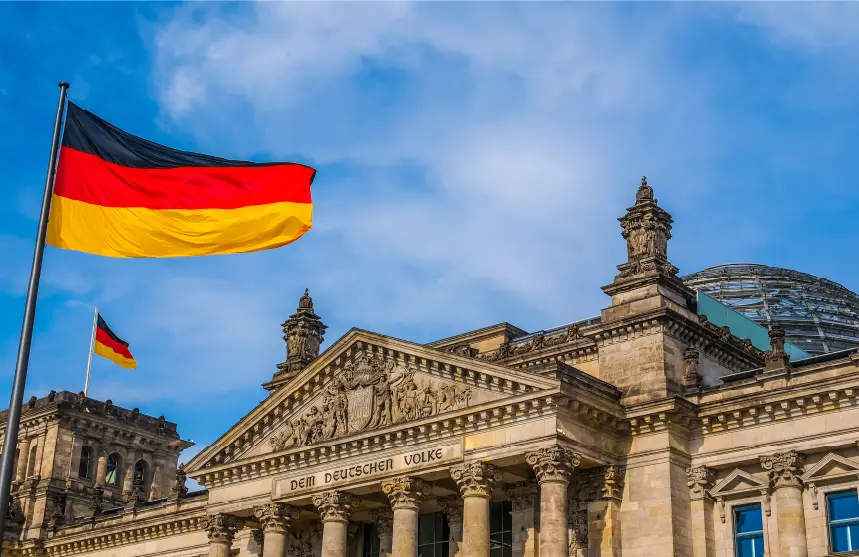IELTS Exam Explained- Complete Study Guide | MetaApply IE
MBA in Germany in 2025: Top Universities, Fees & Jobs

International students who want to study for an MBA abroad choose Germany as their prime destination. Students choose MBA in Germany because its universities offer advanced facilities and blended education approaches that link organisational experience to academic content.
The German nation is an “ideal country offering numerous prospects.” As a leading center for technology and innovation research, Germany appeals to thousands of international students who want to obtain their MBA abroad degrees. Germany is also appealing for individuals seeking knowledge because it places substantial importance on its educational framework.
Students increasingly choose Germany as their destination to obtain their MBA degrees. Many people ask whether Germany provides a suitable environment for MBA studies because of its strong economic foundation and excellent education standards. The answer is yes! Numerous English-language MBA programmes from top-ranking German universities exist worldwide.
The expense of obtaining an MBA is among the key reasons to choose Germany for higher education studies. Private German universities charge between €15,000 to €43,000 (approximately INR 13 lakh to INR 39 lakh) as tuition but public institutions charge minimal to no costs during enrollment. Students need to pay only semester-based fees at universities that range between €100 to €350. International students who want to study for an MBA in Germany can access education at significantly lower prices than in other nations.
MBA in Germany for International Students Highlights
Students are advised to check out the important information related to MBA abroad in Germany for international students mentioned below:
| Parameter | Details |
|---|---|
| Total MBA Colleges in Germany | 45+ MBA colleges |
| Cost of MBA in Germany |
– Public Universities: INR 0 – Private Universities: INR 13.55 – 18.07 Lakh/year – Living Cost: INR 9.3 Lakh/year |
| Top Specialisations | General Management, International Business, Business (others), Finance, Entrepreneurship, Human Resources, Marketing, Healthcare Management |
| Admission Process (Varies by university) |
– Educational Qualification: Bachelor’s Degree – Entrance Exams: GMAT/GRE – Language Proficiency: IELTS/TOEFL/German Language Proficiency – Additional Documents: SOP, LOR, Resume, Work Experience |
Why Study MBA in Germany?
The business education environment in Germany provides diverse MBA abroad programmes that deliver enduring employment perspectives. Professionals interested in becoming managers choose German MBA programmes because they provide excellent academic standards and affordable tuition rates within a stable economic environment.
Students who want to continue their education in Germany have access to many available programs across various educational institutions. A wide range of MBA abroad programmes exists throughout Germany, enabling students to study at various institutions, including business schools, art schools, technical colleges and universities, and state and private universities of technology.
German academic institutions admit students twice annually during January and September of each calendar year. January admission opportunities for universities in Germany remain highly restricted. Students choosing Germany as their MBA study destination can pursue either standard general management-focused degrees or they can select specialised MBA programmes which cater to fields such as healthcare management, consulting and logistics, among others but they need to work hard upon it as entrance exams for MBA abroad are not that easy. Germany has emerged as a leading educational destination due to the substantial variety of MBA programmes available for students.
Best Universities for MBA in Germany
Germany offers an affordable alternative to education costs across European regions. Numerous state-controlled universities offer their curriculum without charging tuition fees, which apply only to highly specialised programmes. However, all candidates must pay an initial yearly administration fee and clear the entrance exams for MBA abroad before starting their academic journey.
The following list presents the top MBA colleges abroad based on their updated global rankings for 2025.
| University | Duration | Total Tuition Fees (EUR) | Total Tuition Fees (INR) |
|---|---|---|---|
| Saarland University | 1 Year | 12,000 | ₹10,83,864 |
| University of Bayreuth | 1 Year | 17,200 | ₹15,53,665 |
| ESMT Berlin | 15 Months | 49,000 | ₹44,26,140 |
| Frankfurt School of Finance and Management | 12 Months / 18 Months | 49,500 | ₹44,71,305 |
| Munich Business School | 12 Months | 32,000 | ₹28,90,540 |
| HTW Berlin | 18 Months | 12,500 | ₹11,29,117 |
| Reutlingen University (ESB Business School) | 12 Months | 9,600 | ₹8,67,162 |
| Hochschule Pforzheim | 16 Months / 21 Months | 8,800 | ₹7,94,895 |
| GISMA Business School | 12 Months | 18,000 | ₹16,25,922 |
| Technical University of Munich | 24 Months | 39,000 | ₹35,22,831 |
| WHU-Otto Beisheim School of Management | 12 Months | 43,000 | ₹38,84,147 |
| RWTH Aachen University | 18 Months | 30,000 | ₹27,09,907 |
| SRH Berlin University of Applied Sciences | 1 Year / 18 Months | 21,600 | ₹19,51,133 |
| Leipzig University | 15-21 Months | 37,500 | ₹33,87,384 |
Cost of studying for MBA in Germany
International students pursuing an MBA in Germany must pay tuition fees, living expenses, and the costs associated with their German study visa.
This section outlines the average expenses for MBA in abroad fees and for International students to live in Germany during their study time. The first-year MBA tuition in Germany amounts to INR 14 Lakhs on average. German residents spend approximately INR 4 lakhs yearly on the typical living expenses in the country.
Each academic year, German universities require international students to deposit their living expenses in blocked accounts, amounting to monthly sums set by the prevailing economic conditions. In January 2022, the minimum required funds for a German Blocked Account increased to 10,332 Euros, which equals 9.2 lakh Indian rupees for yearly study expenses. A student receives 861 Euros, representing 77,180 Indian rupees per month.
Student Visa Cost for Germany
A German Study Visa, also known as a residence permit, is necessary for students who plan to stay in Germany for more than 90 days. Students must pay €110 to obtain their visa application, which is equal to INR 9135.94. A Residence Permit visa normally takes three months (8 to 12 weeks) to process.
The German Visa Application Process now includes a range of fresh developments:
- As of February 17, 2025, the German Foreign Ministry introduced digital.diplo.de which serves as the Consular Services Portal to streamline Germany student visa processing.
- Through the digital.diplo.de portal students access an online application system which enables them to fill out their forms before submitting their documents.
- After finishing their online application, students need to go to VFS Global for a biometric check-up.
MBA Requirements for Germany – Eligibility Criteria
The primary qualifications for MBA students in Germany include these mandatory conditions:
- Aspiring candidates need to possess an undergraduate degree from an accepted academic discipline.
- Most German institutions utilise GMAT/GRE scores to screen their prospective students.
- The following proficiency exams are necessary for German MBA admission:
- German Proficiency Tests require candidates to pass DSH, DSD II, TestDaF, Telc Deutsch C1 Hochschule, Goethe Certificate B2, Telc Deutsch C1 Hochschule, or the Qualification Assessment examination.
- German Universities demand IELTS or TOEFL iBT or PTE English language results before conducting their own personal university interview for prospective students.
- To start studies at German universities, students need at least 2-3 years of work experience, which must meet the university admission standards.
Work Permit after studying MBA in Germany
After completing their Master’s in Germany (MS in Germany) students automatically gain permission to start working in Germany. International students who study in Germany can access a work permit for eighteen months following graduation to find employment in Germany.
The post-study work permit in Germany provides international students with an extended period of 18 months to seek employment. Candidates maintain their flexibility during these 18 months by seeking employment on their own terms to generate income. International students wishing to stay permanently in Germany must apply for an ‘EU Blue Card’ – Residence Permit, which they can initiate two years after obtaining their work visa.
MBA Scholarships for Germany
Students who seek foreign scholarships for studying abroad find their options divided between awards granted based on academic merit alongside financial assistance that addresses demonstrated financial need.
University-based scholarships alongside government and private organisation scholarships serve as university strategies to recruit international student populations.
Candidates seeking scholarships for MBA abroad for German studies can find the complete range of study-abroad scholarships on our website for their reference. Our website shows over 2000 distributed scholarships across 11 countries with total financial support worth INR 1.3 crores. The following represent the most popular MBA scholarships available in Germany:
| Scholarship | University | Award |
|---|---|---|
| Women in Business Scholarship | ESMT Berlin | €5,000 |
| Frankfurt School Scholarships | Frankfurt School of Finance and Management | Up to 30% of the tuition fee |
| MBA Scholarships | Munich Business School | Up to €4,000 |
| SRH Scholarship for International Students | SRH Berlin University of Applied Sciences | 50% first-year tuition fee waiver |
| Women for Leadership Scholarship | SRH Berlin University of Applied Sciences | 50% first-year tuition fee waiver |
| FS MBA Scholarship | Frankfurt School of Finance and Management | 30% tuition fee waiver |
| British Council IELTS Awards | Government of Germany | €3,000 – €10,000 |
| HHL Future Entrepreneur Scholarship | Leipzig Graduate School of Management | 25% tuition fee waiver |
| Erasmus Mundus Joint Masters Scholarships | Government of Germany | Covers program cost, travel, and living allowance |
Job Scope after MBA in Germany
Students who complete their MBA in German universities become eligible to join high-paying positions at globally respected firms. The Post-Study Work Visa serves as a requirement for graduates who want to work in Germany after finishing their studies.
- Students who finish their studies can get an 18-month Residence Permit to find work opportunities in their educational field.
- The 18-month residence permit lets you work any kind of job, which supports your job search expenses while maintaining yourself financially.
- The process of obtaining a residence permit depends on your educational qualifications along with current job market requirements.
- The EU Blue Card of Germany operates as a legal residence document for work purposes regardless of EU citizenship.
- Your eligibility requires a bachelor’s degree, and a German company must sign a contract to give you a fixed salary.
- Students earn between 31 lakhs INR and 71 lakhs INR per year as their first salary following graduation with an MBA from German institutions.
Conclusion
International students who want to earn an MBA should choose Germany because it provides reasonable tuition rates combined with exceptional employment opportunities and internationally acclaimed educational institutions. People who seek career growth in finance consulting or technology sectors can access diverse prospects through studying an MBA program in Germany.
Students can use MetaApply IE to simplify their application process while also identifying top-ranked MBA programs in Germany. MetaApply IE establishes student-university connections and guides through university applications while serving as an expert source for scholarship and job opportunities. Your MBA program in Germany may begin with your first application through MetaApply IE.
Frequently Asked Questions
Students opt for Germany as their MBA destination because it provides reasonable tuition costs with high-quality educational programs and solid career options in a thriving economy.
International students studying in Germany receive permission to work for 120 consecutive days full time or 240 days half time annually.
MBA graduates in Germany typically obtain salaries ranging from €60,000 to €100,000 each year based on both their industry placement and work experience levels.


















































